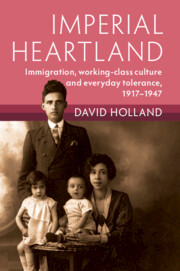Book contents
- Imperial Heartland
- Modern British Histories
- Imperial Heartland
- Copyright page
- Dedication
- Epigraph
- Contents
- Figures
- Maps
- Acknowledgements
- Abbreviations
- Introduction
- 1 Sheffield, ‘Steel City’
- 2 The Sheffield Area’s South Asian Migration Networks
- 3 Working Lives
- 4 Marriage, Belonging and Tolerance in the Era of Moral Condemnation
- 5 Empire, Racism and Everyday Tolerance
- Conclusion
- Bibliography
- Index
Introduction
Published online by Cambridge University Press: 03 August 2023
- Imperial Heartland
- Modern British Histories
- Imperial Heartland
- Copyright page
- Dedication
- Epigraph
- Contents
- Figures
- Maps
- Acknowledgements
- Abbreviations
- Introduction
- 1 Sheffield, ‘Steel City’
- 2 The Sheffield Area’s South Asian Migration Networks
- 3 Working Lives
- 4 Marriage, Belonging and Tolerance in the Era of Moral Condemnation
- 5 Empire, Racism and Everyday Tolerance
- Conclusion
- Bibliography
- Index
Summary
The first half of the twentieth century is often characterised as a period of economic, political and moral collapse among European nations. Widespread ultra-nationalism, racist and eugenic theories, anti-Semitism, imperialism and world war are all closely and inseparably linked with the period. The rise of fascism across Europe had its British analogue in the Blackshirts of Sir Oswald Mosley’s British Union of Fascists, notorious for organising and marching for a ‘Greater Britain’ and in defence of the Empire, within working-class districts.1 Indeed the sporadic rioting and disorder which accompanied the Blackshirts’ attempt to march through London’s East End, together with the race riots that took place in a number of British ports in the immediate aftermath of the First World War, are viewed as symptomatic of the febrile atmosphere of racial tension during the inter-war period in Britain. ‘Hitlerism’, as the philosopher Hannah Arendt noted in January 1944, exercised its strong international and inter-European appeal during the 1930s ‘because racism, although a state doctrine only in Germany, had been everywhere a powerful trend in public opinion’.2
Keywords
- Type
- Chapter
- Information
- Imperial HeartlandImmigration, Working-class Culture and Everyday Tolerance, 1917–1947, pp. 1 - 25Publisher: Cambridge University PressPrint publication year: 2023



